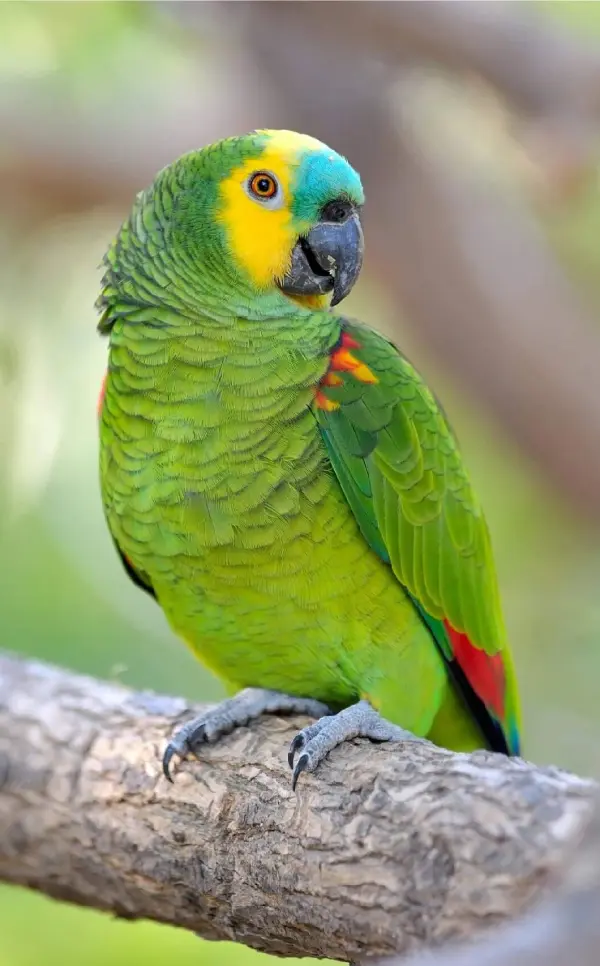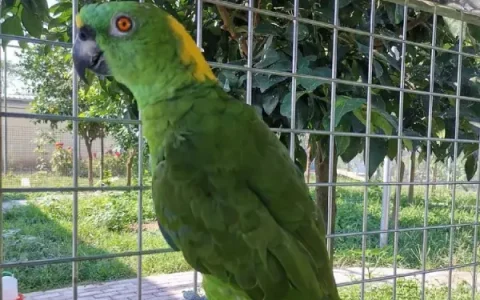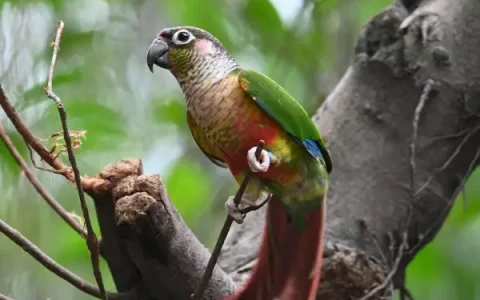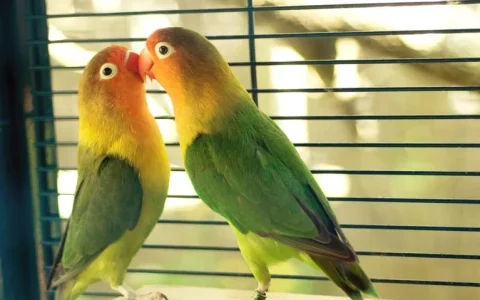As an avid parrot enthusiast with over fifteen years of experience caring for Amazon parrots, I’ve developed a particular fascination with the vocal capabilities of Blue-Fronted Amazons (Amazona aestiva). Through daily interactions with my own birds, collaboration with avian veterinarians, and participation in parrot owner communities, I’ve gathered substantial firsthand knowledge about their talking abilities. This guide provides a comprehensive look at what makes these parrots exceptional vocalists, grounded in both scientific understanding and practical experience.

1. Vocal Capabilities: More Than Just Talking
Natural Vocalizations
Blue-Fronted Amazons are naturally vocal birds with an extensive repertoire:
- Contact calls: Loud, piercing calls used in wild flock communication
- Mimicry of environmental sounds: Exceptional ability to replicate phones, microwaves, and other household sounds
- Emotional expression: Varied vocalizations indicating contentment, excitement, or distress
- Diurnal patterns: Typically most vocal at dawn and dusk
Talking Ability Assessment
- Clarity: Among the clearest avian speakers, often with remarkable human-like quality
- Vocabulary potential: 50-100+ words and phrases with consistent training
- Contextual use: Advanced capability to associate words with meanings and situations
- Musical ability: Strong propensity for whistling tunes and mimicking musical phrases
2. Comparison With Other Talking Parrots
| Species | Talking Clarity | Vocabulary Size | Learning Speed | Voice Quality |
|---|---|---|---|---|
| Blue-Fronted Amazon | Excellent | Large | Moderate | Clear, human-like |
| African Grey | Exceptional | Very Large | Fast | Robotic, precise |
| Yellow-Naped Amazon | Excellent | Large | Moderate | Clear, loud |
| Eclectus Parrot | Very Good | Moderate | Slow | Soft, sweet |
| Sun Conure | Fair | Small | Fast | Scratchy, nasal |
3. Factors Influencing Talking Ability
Individual Variation
- Age: Younger birds (1-5 years) typically learn fastest
- Sex: Both males and females talk well, though males may be more vocal
- Personality: Outgoing, confident individuals often more inclined to vocalize
- Environment: Birds in socially active households learn more quickly
Training Considerations
- Social interaction: Regular, positive human interaction essential for development
- Consistency: Daily training sessions of 10-15 minutes most effective
- Reward system: Positive reinforcement with favorite treats accelerates learning
- Environmental stimulation: Variety of sounds and social interaction encourages mimicry
4. Training Techniques for Optimal Results
Effective Methods
- Conversational repetition: Regular use of words and phrases in context
- Interactive training: Engaging bird in back-and-forth vocal exchanges
- Audio reinforcement: Recordings of desired words or phrases (supplemental only)
- Social learning: Exposure to other talking birds or human conversation
Common Mistakes to Avoid
- Yelling or loud voices: May encourage screaming rather than talking
- Inconsistency: Irregular training hampers progress
- Negative reinforcement: Creates fear rather than encouragement
- Overwhelming the bird: Too many words at once causes confusion
5. Beyond Words: Comprehensive Vocal Behavior
Natural Sounds and Their Meanings
- Contact calling: Normal behavior indicating desire for interaction
- Beak grinding: Contentment and relaxation
- Hissing or growling: Fear or territorial behavior
- Crest raising: Excitement or heightened awareness
Managing Excessive Vocalization
- Environmental enrichment: Adequate toys and foraging opportunities
- Routine establishment: Predictable daily schedule reduces anxiety
- Appropriate attention: Balancing interaction with independence
- Volume management: Training “quiet” command using positive reinforcement
6. Realistic Expectations and Timeline
Learning Progression
- 3-12 months: First words typically emerge, often simple greetings
- 1-3 years: Vocabulary expands significantly, phrases develop
- 3+ years: Contextual understanding and appropriate usage improves
Individual Differences
- Early talkers: Some individuals speak within first few months
- Late bloomers: Others may take years to develop substantial vocabulary
- Selective talkers: Some birds choose only specific words or sounds
- Non-talkers: Rare, but some individuals never develop speech despite training
7. Health and Wellness Considerations
Factors Affecting Vocalization
- Physical health: Respiratory issues can affect vocal ability
- Nutrition: Proper diet supports overall health and cognitive function
- Mental health: Stress or boredom may reduce vocalization
- Age-related changes: Senior birds may vocalize less
When to Seek Professional Advice
- Sudden changes in vocalization: May indicate health issues
- Consistent silence: Could suggest hearing or other health problems
- Excessive screaming: May require behavioral consultation
- Breathing difficulties: Immediate veterinary attention needed
8. Ethical Considerations and Commitment
Ownership Responsibilities
- Lifelong commitment: 40-60 year lifespan requires long-term dedication
- Social needs: Daily interaction and mental stimulation essential
- Environmental requirements: Large space, appropriate cage, and safe environment
- Financial investment: Significant costs for proper care and veterinary expenses
Conservation Status
- Wild population: Decreasing due to habitat loss and illegal trade
- Captive breeding: Recommended over wild-caught specimens
- Legal considerations: CITES restrictions apply to international trade
Conclusion: Celebrating Vocal Excellence
Blue-Fronted Amazon parrots stand among nature’s most gifted avian vocalists, capable of developing impressive vocabularies with remarkable clarity. However, their value extends far beyond mere mimicry. These intelligent, emotional creatures form deep bonds with their human companions and use their vocal abilities as part of complex social interaction.
While their talking ability is indeed impressive, prospective owners should remember that each bird is an individual with unique capabilities and preferences. The joy of living with a Blue-Fronted Amazon comes not just from their speech, but from their vibrant personality, intelligence, and the deep bond that develops through patient, consistent interaction.
Whether your Amazon becomes a prolific talker or chooses to express itself through other means, the relationship you build will be rewarding for decades to come. The key is to provide a nurturing environment, appropriate training, and realistic expectations while celebrating your bird’s unique personality and abilities.
This information is based on personal experience, consultation with avian veterinarians, and current avian behavior research. Individual birds may vary in their capabilities and needs.
Article title: Can Blue-Fronted Amazon Parrots Talk?
Article link: https://www.parrot234.com/can-blue-fronted-amazon-parrots-talk/
Disclaimer: The content of this site is contributed by users, compiled from the Internet, or edited by AI, so no guarantee can be made for the authenticity of the content! Please judge the authenticity of the content by yourself! However, if you find any suspected: plagiarism, infringement, illegal and irregular, suspected fraud, false and bad content, please contact this site in time through the "Contact & Suggestion" channel at the bottom. This site always maintains an active and cooperative attitude to deal with various problems, so after receiving the email, the corresponding content will be deleted!




